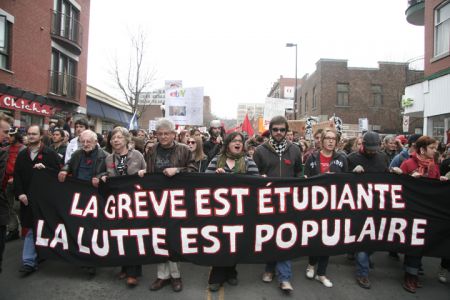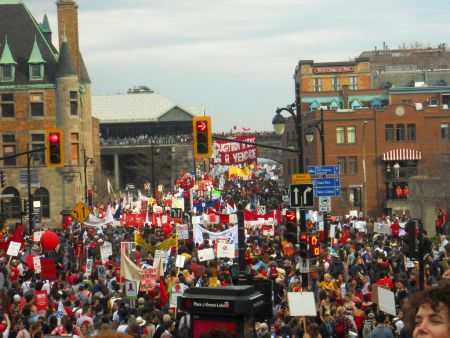[Updates below]
The Quebec government has introduced legislation which they say is necessary in order to restore social order during the ongoing student strike, but which critics are denouncing as threatening the right to protest in Quebec.
“This bill, if adopted, is a breach to the fundamental, constitutional rights of the citizens,” said Louis Masson, president of the Quebec Bar Association. The Quebec Bar Association is just one of the organizations that have spoken out since the law was introduced to parliament last night.
The debate began around 9pm Thursday and is ongoing (watch live here).
Among other things, the law will require all organizers of a demonstration of 10 people or more to submit their itinerary, including route, date, time and duration, to police eight hours in advance, and to refrain from demonstrating within 50 metres of any teaching establishment.
This morning, in a press conference, student leaders and unions also spoke out against the law.
"If we are no longer able to protest in our society, it becomes a totalitarian society," said Louis Roy, head of the Confédération des Syndicats Nationaux (CSN), which represents most university and college teachers in the province. "We are telling our members to defend their fundamental right, the right to demonstrate," he added.
One of the spokespeople for the organization representing the majority of the 155,000 students on strike said they may participate in civil disobedience to challenge the law. "[We] are not excluding the possibility of disobeying this special law," said Gabriel Nadeau-Dubois, co-spokesperson with the Enlarged Coalition of the Association for a Solidarity Among Student Unions (CLASSE).
As of 12:15, a petition calling for the law to be stopped had 23,000 signatures. The organizers of the petition, online at http://loi78.com are trying to reach 100,000 signatures by 4pm today.
The proposed law, known as "Bill 78: A Law Allowing Students to Receive the Education Provided by the School Which They Attend," contains 36 articles. Several of these articles are raising concerns, including:
•Any demonstration including 10 or more people would need to submit its route, location, time, date and duration to police at least eight hours in advance for approval. Police would be allowed to order modifications to the protest.
•Protest organizers, as well as any student association or federation of associations that participate in a demonstration, are accountable for the actions of all participants in the demonstration, under threat of fine.
•All protests that may hinder access to classes, whether directly or indirectly, are not allowed within 50 metres of the grounds of any teaching establishment. All protests within schools that hinder access to classes, stops the resumption or continuation of classes are also banned.
Read the entirety of the proposed legislation here.
These rules apply to both any action or omission which may lead to classes being disrupted.
The law would also require teachers to report any disruptive actions, which has already led union leaders to denounce that their members would be transformed into a pseudo-police force.
Should any student association be reported to be taking part in these kinds of activities, the government reserves to right to suspend all student union fees (at the rate of one semester's worth of fees per day that the law is broken), as well as access to campus offices. Both fees and access to offices are provided under the Quebec student union accreditation law.
The bill also stipulates that any person who, by act or omission, aids, or by encouragement, counsel, consent, authorisation or order, brings, another person to break any of the provisions of this law is also held accountable and is liable to the same fines.
Fines for breaking any aspects of this law would be:
$1,000 to $5,000 for individuals
$7,000 to $35,000 for leaders, employees or representatives of any student association or employees' association, leaders or representatives of an institution, or individual who organizes a demonstration
$25,000 to $125,000 for any student association, federation of associations, employees' association or institution, or moral person, organization or coalition which organizes a demonstration
In case of recurring offenses, fines would double.
If this bill passes, which it most likely will, since the Liberal party holds a majority in parliament, it is still unclear when it will go into effect. Montrealers have held 23 straight night-time demonstrations, wth the 24th scheduled for this evening. Each of the demonstrations would have broken multiple provisions of Bill 78 on several occasions.
It is also unclear how the bill will define indirect actions hindering classes. When asked whether wearing a red square in class would violate the law, Education Minister Michelle Courchesne said that that would be up to the courts to decide.
Even those who support the law, such as the Conseil du Patronat du Québec, have expressed concerns that is does not actually lead Quebec out of the tuition fee impasse. On CBC Radio Montreal today, the head of the council said that the government still has not presented a solution to actually end the student strike.
CLASSE has already been calling for a major demonstration on May 22nd, the one hundredth day of the strike. Unions expressed their support for the May 22 action and for challenging the regulations, and comments online and in the media are brimming with anger over the law. Should the government not change route and negotiate with students leaders, all signs point to a continued strike and a very large demonstration on May 22.
UPDATE 17:39: The bill has passed, 68 votes for, 48 votes against. Québec Solidaire MNA Amire Khadir, Option National MNA Jean-Marie Aussant, all independent MNAs and the Parti Québécois voted against.
The Coalition Avenir Québec backed the Liberals after a series of amendments, including raising the number of people necessary in a demonstration needed to force organizers to give their route to police to 50, and specifying that police can not only review, but also demand modifications to any demonstration it deems to put the public security at risk






